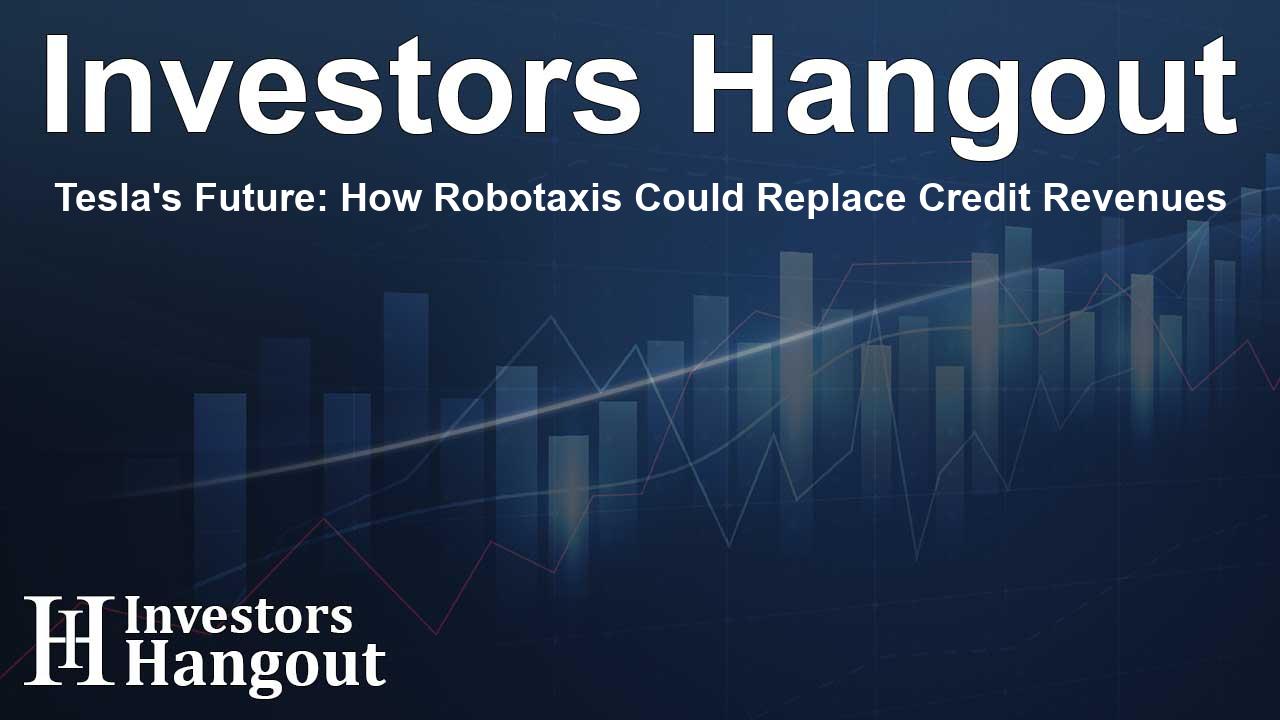Tesla's Future: How Robotaxis Could Replace Credit Revenues

Tesla's Financial Outlook and Robotaxi Rollout
Tesla Inc (NASDAQ: TSLA) is gearing up for the release of its quarterly earnings soon, and expectations have shifted quite a bit since last year. Analysts are currently predicting a decrease in earnings per share, estimating it at $0.28 compared to last year's $0.42. This marks a significant adjustment, largely influenced by Elon Musk's ongoing political exposure and market conditions.
As it stands, TSLA's stock is down by 13% this year, trading at $327, which does remain above its 52-week average of approximately $299.19. Tesla's price-to-earnings (P/E) ratio remains notably high at 166, dwarfing competitors like BYD and Ford, whose P/E ratios stand at 51.8 and 9.88, respectively. This disparity illustrates that investors perceive Tesla as more than just a car manufacturer; they see it as a frontrunner in innovative technology, particularly in the realms of autonomous driving and energy solutions.
Key Macro Influences on Tesla's Stock
Recent comments from leading monetary figures have indicated that the broader economic landscape can affect Tesla's stock price. At a recent European Central Bank Forum, Fed Chair Jerome Powell addressed the potential for interest rate cuts that could directly impact consumer financing options, a crucial factor for Tesla as it pushes for growth in car sales.
The current interest rate regime is a hot topic, especially given the recent inflation reports. While hopes for rate cuts linger, they are not yet realized. A reduction in rates could mean lower borrowing costs for consumers, making it easier for them to purchase Tesla vehicles, which would, in turn, benefit the company financially.
Impact of Legislation on Revenue
An additional challenge approaching Tesla is the loss of revenue from carbon credits, especially following the passage of the One Big Beautiful Bill Act (OBBBA), which is set to phase out clean vehicle credits after 2025. This legislative shift is projected to result in a substantial annual revenue loss for Tesla, estimated to be around $2 billion.
While Tesla maintains dominance in the electric vehicle market, increased competition from Chinese automakers, along with stricter regulations in the European market, pose significant hurdles. Furthermore, Musk's political persona may adversely affect the brand's reputation across various media outlets.
Future Innovations: Robotics and Robotaxi Service
Despite these challenges, Tesla's potential for growth through robotaxis and enhanced energy technology appears promising. The upcoming rollout of robotaxis is generating mixed sentiments from consumers and analysts alike, with some viewing it as a critical milestone for the company's future.
Furthermore, advancements in Tesla's humanoid robot, Optimus, have stirred excitement. As these innovations take hold, they could redefine Tesla's market position significantly, provided that they deliver on their ambitious promises.
Tesla's recent energy division has shown robust growth, achieving a 154% increase in capacity year-over-year. This expansion reflects the company's commitment to diversifying beyond just electric vehicles and could prove instrumental in offsetting revenue losses from carbon credits.
With the robotaxi initiative viewed as a pivotal transformation for the company, analysts are keeping a close watch on the reliability of the Full Self-Driving (FSD) data. Cavenagh Research showcases estimates that indicate a massive potential profit of $14,125 annually for each robotaxi, assuming strategic partnerships with ride-sharing giants within the market.
Market Predictions and Investor Sentiment
As of now, many analysts have mixed opinions on TSLA’s stock, with an average price target set below the current trading price. The general consensus is divided, with both buy and hold recommendations weighing equally among analysts. Despite the projected $1.3 trillion increase in enterprise value tied to robotaxi developments, caution remains prevalent in investor sentiment.
In the face of potential headwinds with regulations and competition, Tesla's future appears to hinge on how effectively it can leverage its innovations for financial stability and growth. With the landscape constantly evolving, the upcoming earnings report will be crucial in determining the direction of TSLA in the near term.
Frequently Asked Questions
What is the latest prediction for Tesla's Q2 earnings?
The expected earnings per share for Tesla in Q2 is estimated to be $0.28, lower than last year’s $0.42.
How has Tesla's stock performed recently?
As of now, TSLA stock is down 13% year-to-date, trading at $327.
What is the anticipated impact of the OBBBA on Tesla's revenue?
The OBBBA is expected to reduce Tesla's annual revenue from carbon credits by approximately $2 billion.
How are robotaxis expected to impact Tesla's growth?
Robotaxis could significantly contribute to Tesla's enterprise value, potentially adding around $1.3 trillion as their reliability and market implementation improve.
What are analysts saying about Tesla's stock?
Analysts have a mixed view of TSLA's future, with equal recommendations to buy and hold, pointing out the potential but also the challenges ahead.
About The Author
Contact Owen Jenkins privately here. Or send an email with ATTN: Owen Jenkins as the subject to contact@investorshangout.com.
About Investors Hangout
Investors Hangout is a leading online stock forum for financial discussion and learning, offering a wide range of free tools and resources. It draws in traders of all levels, who exchange market knowledge, investigate trading tactics, and keep an eye on industry developments in real time. Featuring financial articles, stock message boards, quotes, charts, company profiles, and live news updates. Through cooperative learning and a wealth of informational resources, it helps users from novices creating their first portfolios to experts honing their techniques. Join Investors Hangout today: https://investorshangout.com/
The content of this article is based on factual, publicly available information and does not represent legal, financial, or investment advice. Investors Hangout does not offer financial advice, and the author is not a licensed financial advisor. Consult a qualified advisor before making any financial or investment decisions based on this article. This article should not be considered advice to purchase, sell, or hold any securities or other investments. If any of the material provided here is inaccurate, please contact us for corrections.
